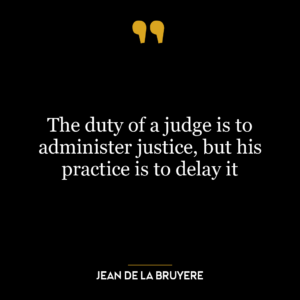This quote by Seneca the Younger encompasses two key aspects: the power of determination and the importance of justice.
The first part of the quote, “May be is very well, but Must is the master”, underscores the significance of conviction and determination. “May be” represents uncertainty, indecisiveness, and passivity, while “Must” symbolizes determination, decisiveness, and action. Seneca is emphasizing that while it’s okay to consider possibilities and options (the “may be”), it’s the definitive actions (the “must”) that truly shape our lives and the world around us.
The second part of the quote, “It is my duty to show justice without recompense”, speaks to the importance of doing what’s right without expecting anything in return. Here, Seneca is emphasizing the moral responsibility each individual carries to uphold justice and fairness, not for personal gain or reward, but because it is the right thing to do.
Applying this quote to today’s world, we can see its relevance in various spheres of life. For instance, in personal development, the idea of “Must is the master” encourages individuals to move beyond contemplation and take decisive action towards their goals. It’s a call to shift from passive thinking to active doing, which is a crucial step in personal growth and achievement.
As for the concept of showing justice without recompense, it resonates with the idea of selfless service and ethical responsibility that’s relevant in all aspects of life, from personal relationships to professional conduct. In a world where actions are often driven by personal gain, this quote serves as a reminder to uphold justice and fairness, even when there’s no reward in sight. This could mean standing up for what’s right, treating others fairly, or making ethical decisions, regardless of the personal cost.
In conclusion, this quote by Seneca the Younger is a powerful message about the power of determined action and the importance of upholding justice selflessly. It serves as a timeless guide for personal development and ethical conduct, relevant in both the ancient and modern worlds.













